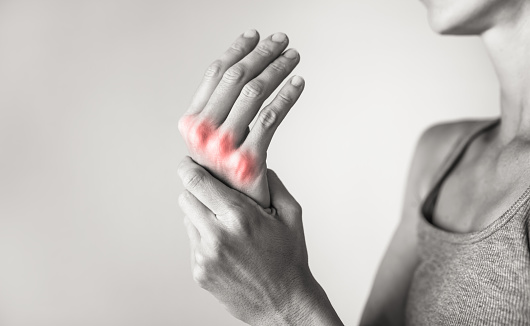Rheumatoid Arthritis And Hormone Balance
Women are aware of the problems of osteoporosis and osteoarthritis, but not many know of the link between hormone balance and rheumatoid arthritis.

Rheumatoid arthritis is a painful condition and NHS data shows about 400,000 people have rheumatoid arthritis in the UK, with about three times as many women affected than men.
As a sufferer myself I can confirm it typically causes joint pain and inflammation in areas such as the hands, knees and ankles, as a result of the immune system attacking its own body cells.
If you believe you have it, then your doctor can give you a blood test to establish this.
What is rheumatoid arthritis?
It is an autoimmune disease that causes inflammation in your joints. The main symptoms are joint pain and swelling and is the second most common form of arthritis in the UK.
The ends of your bones are covered with cartilage, which has a very smooth, slippery surface. The cartilage allows the ends of your bones to move against each other almost without friction.
The joint is surrounded by the synovium, which produces a small amount of synovial fluid that nourishes the cartilage and lubricates the joint.
The synovium has a tough outer layer called the capsule that, together with the ligaments, holds your joint in place and stops the bones moving too much. Strong fibrous bands called tendons anchor the muscles to the bones.
Rheumatoid arthritis causes inflammation in the synovium and the result is very similar to inflammation that you may have seen if you’ve had an infected cut or wound – it goes red, swells, produces extra fluid and is painful.
The redness is caused by the flow of blood increasing. As a result, the inflamed joint may feel warmer than usual and the inflammation is caused by a build-up of fluid and cells in the synovium.
Such joints are often painful as your nerve endings are irritated by the chemicals produced by the inflammation and the capsule, the outer layer of the synovium, is stretched by the swelling in your joint.
When the inflammation goes down, the capsule remains stretched and can’t hold your joint in its proper position which can make your joint unstable, and it can move into unusual or deformed positions.
Some damage is done to the joints every time they’re inflamed, and the joint can be worn away after repeated flare-ups.
How is it related to hormone balance?
Rheumatoid arthritis is an autoimmune disease and progesterone acts as an anti-inflammatory, whereas oestrogen tend to be pro-inflammatory, so if you are oestrogen dominant that can make a difference to your symptoms.
Studies have documented low progesterone levels in women with autoimmune diseases and show that an imbalance in favour of higher oestrogen levels may contribute to immune reactivity in women.
A recent study also indicated that going through the menopause before the age of 45 was found to have a 46 per cent heightened risk compared to those at the age of 50-51.
Studies by Karlson and Cutolo in 2009 concluded that ensuring adequate levels of progesterone to balance excess oestrogen in women may help with some underlying features of the disease.
What can help
Clearly having good levels of progesterone to offset any oestrogen dominance is an excellent place to start with self help measures.
There’s some scientific evidence that certain diets may help the symptoms in some people, but it can be trial and error.
You need to look for an anti-inflammatory diet and Andrew Weil, MD has a specific diet on his website as well as excellent books by nutritionist Patrick Holford.
The diets most likely to help are:
– low in saturated fats
– high in unsaturated fats
– a good supply of vitamin C
– Omega-3 from supplements or oily fish
There’s some evidence that a very strict vegetarian diet can help, and that people who eat a lot of red meat may have a slightly increased risk of rheumatoid arthritis.
Helpful information:
Generally it is an unfortunate fact that at Menopause many women do put on additional weight around the middle and this is often related to excess oestrogen, oestrogen dominance.
In order to help rebalance this you would need to supplement with bioidentical progesterone and a diet that will support that.
One diet that is universally recommended for a number of health conditions – and in particular for inflammation – is the Mediterranean diet.
The article below will give you plenty of reasons why you would find it a good diet to follow if you have arthritis..
https://anna.blog.wellsprings-health.com/12-reasons-to-love-the-mediterranean-diet/


















